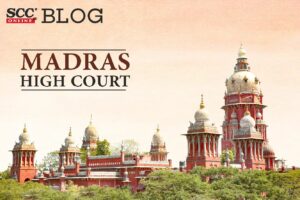Madras High Court: In a criminal original petition filed under Section 482 of the Code of Criminal Procedure (CrPC) for quashing of First Information Report (FIR) registered under Section 354 of the Penal Code, 1860 (‘IPC’) and Section 4 of Tamil Nadu Prohibition of Harassment of Woman Act, 2002 against self-styled Godman Shiva Sankar Baba, R.N. Manjula, J. has held that even though the allegations made by the respondent are serious in nature, however, due to the absence of petition under Section 473 CrPC to condone the delay filed along with the complaint, the case is barred by limitation; and as the investigation cannot serve any fruitful purpose , thus, for the reasons of technical flaw, the FIR was quashed.
The accused Shiv Shankar baba is an influential religious person for whom there were lot of devotees, and there were serious complaints against him that the children studying in his school were the targets for his sexual exploitation.
The Counsel for Shiv Shakar baba has submitted that there is a huge delay in giving the complaint and on the date of the complaint itself, the case is barred by limitation. To this the Public Prosecutor submitted that even at the time of filing the charge sheet before the Court, the prosecution would file a petition for extension of period of limitation under Section 473 CrPC. and get the delay condoned and hence the FIR cannot be quashed on the ground of delay alone.
The Court observed that the offence of sexual abuse is a serious and heinous crime and there is always an understandable reluctance on the part of the victim to come forward and make a complaint immediately, after the occurrence. Further, the contributive factors for non-reporting of such cases are not only fear or shame in the mind of the victim, but also the intimidating influential position of the perpetrator in society.
The Court viewed that it is not uncommon when long suppressed illegal acts of any influential person is brought out, many people affected by him will get emboldened and courageous to report about the unlawful acts. Also, the respondent had stated in her complaint that she gathered courage after seeing many complaints of sexual abuse made against Shiv Shankar baba.
The Court observed that from the date of the occurrence of the offence, the time was running, hence the case is barred by limitation in view of Section 468 CrPC, however, as submitted that if the prosecuting agency gives convincing reason to condone the delay while filing the report, it is quite possible to get the case taken on file, thus, the question to analyse is that ,when the cognizance is taken by the Court and at what point of time, a petition under Section 473 CrPC. can be filed to condone the delay.
The Court took note of Section 190 CrPC that provides for Cognizance of offences by Magistrates, and further referred to Sarah Mathew v. Institute of Cardio Vascular Diseases, (2014) 2 SCC 62, wherein it was held that “Magistrate takes cognizance when he applies his mind or takes judicial notice of an offence with a view to initiating proceeding. Further, the petition to condone the delay should be filed at the time of giving the complaint itself”, thus, observed that the date of filing the complaint is material for filing a petition under Section 473 CrPC.
The Court noted that in the present case, at the time of filing the complaint, no petition under Section 473 CrPC. was filed, and the FIR sent to the Magistrate did not accompany any such petition. Further, it was observed that the act of cognizance by the Magistrate would start from the moment the Magistrate applies his mind while reading the FIR, hence the relevant date for filing the petition under Section 473 CrPC is the date on which the complaint is sent to the Magistrate and not while filing the final report, and as no petition for condonation of delay was filed along with the complaint, the case is barred by limitation.
[Shiva Sankar Baba v. State of Madras, Criminal Original Petition No. 23806 of 2021, decided on 17-10-2022]
Advocates who appeared in this case :
R. Vijaya kumar, Advocate, for the Petitioners;
A. Damodaran, Additional Public Prosecutor, for the Respondent.

